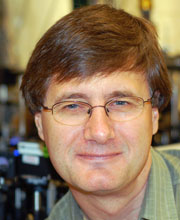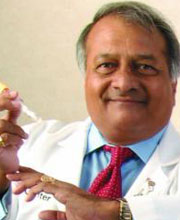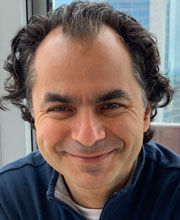The Innovator of the Year award recognizes established Ohio State researchers who are actively working to promote commercialization of university intellectual property, through invention disclosures filed, patents applied for and/or received, technologies licensed or spin-off companies formed. The award cultivates an entrepreneurial spirit among all of our investigators. Join us in congratulating the 2020 Innovator of the Year finalists.
Daniel Gauthier, PhD
 Professor
Professor
Department of Physics
Department of Electrical and Computer Engineering
Daniel Gauthier’s research interests include machine learning, dynamics of complex networks related to information processing, reservoir computing, high-rate quantum communication, quantum repeaters and nonlinear quantum optics. As a post-doctoral research associate at the University of Oregon, Gauthier developed the first CW two-photon optical laser. While a professor at Duke University, he was a founding member of the Duke Fitzpatrick Institute for Photonics. Gauthier was named a Young Investigator of the U.S. Army Research Office and the National Science Foundation. He is a member of the American Association for the Advancement of Science and of the Institute of Electrical and Electronics Engineers Photonics Society, and a Fellow of the Optical Society of America and the American Physics Society.
He received his BS, MS and PhD in optics from the University of Rochester.
Watch a video on Dr. Gauthier’s new approach to machine learning and cybersecurity.
Pravin T. P. Kaumaya, PhD

Professor
Department of Obstetrics and Gynecology
Pravin Kaumaya holds appointments in the Department of Obstetrics and Gynecology and the James Comprehensive Cancer Center. He also directs the OB/GYN Peptide and Protein Engineering Laboratory in Ohio State’s College of Medicine. Kaumaya is an internationally recognized expert in the fields of vaccine research, with emphasis on peptide vaccines for cancer. He conducts research in the areas of tumor immunology, mechanisms of tumor cell-immune cell interactions and immune mechanisms. His work over three decades in developing B-cell epitope-based cancer vaccines is a paradigm shift in the immune-oncology landscape. The laboratory functions as an integrated translational research program from bench to the clinic with the goal of designing and developing new combination immunotherapies and immunologic strategies for cancer treatment and prevention. He is an inventor on several issued and pending patents for peptide cancer vaccines and immune-therapeutic technologies. Kaumaya is an elected fellow of the American Association for the Advancement of Science.
Kaumaya received his PhD from the University of Portsmouth, Hants, UK.
Watch a video on Dr. Kaumaya’s innovative PD-1 vaccine and combination immunotherapy.
Alper Yilmaz, PhD

Professor
Department of Civil, Environmental and Geodetic Engineering
Alper Yilmaz focuses his research on the development of wireless geolocation technology, which is the basis of the start-up firm Ubiher, a unique innovation providing a standalone solution to finding the position of an object or person. He is a senior member of the U.S. National Academy of Inventors and a senior member of the Institute of Electrical and Electronics Engineers. Yilmaz is chair of the International Society for Photogrammetry and Remote Sensing Working Group 5 of Technical Commission II on Dynamic Scene Understanding. He is the editor-in-chief for the Photogrammetric Engineering and Remote Sensing Journal. His research has received over $11M in extramural funding. He was awarded the Lumley Research Award and the Lumley Interdisciplinary Research Award from Ohio State, honorable mention for the Masao Horiba Award (Japan), and the Presidential citation of the American Society for Photogrammetry and Remote Sensing.
Yilmaz received his MS and PhD in computer science from the University of Central Florida.
Watch a video on Dr. Yilmaz’s autonomous navigation framework without the requirement of infrastructure.